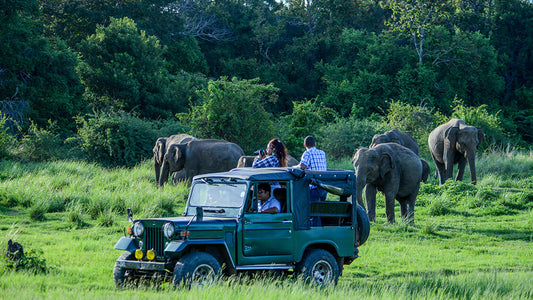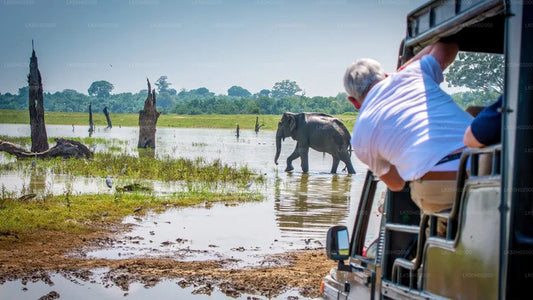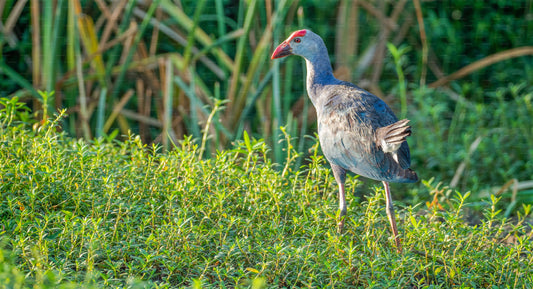
Bundala National Park
This safari takes you through the Bundala Bird Park, a sanctuary for migratory waterbirds, offering a vibrant display of birdlife in a Ramsar Wetland. As you explore, you'll encounter a variety of colorful birds that migrate to Sri Lanka for winter. Additionally, butterfly enthusiasts will be delighted with the abundance of species fluttering through the diverse ecosystems. The park’s varied landscapes, from lagoons to grasslands, offer a rich biodiversity perfect for both birdwatchers and nature lovers. This journey provides a rewarding exploration of one of Sri Lanka’s most important wetlands, combining tranquility with the excitement of wildlife discovery.
Bundala National Park
Bundala National Park is located 251 km southeast of Colombo, close to the City of Hambantota in the Southern Province of Sri Lanka.
Reaching Bundala National Park: Bundala National Park can be reached by A2 main motor road that runs from Colombo to Hambantota
Climate at the Bundala National Park: The general climate of Bundala National Park is hot and dry. While the average Temperature is 27 degrees Celsius, the annual rainfall varies between 900mm to 1300mm. Dry season’ falls between May and September.Best time to visit is September to March: during this period migratory birds arrive at the park.
Bundala National Park spread an area of 6216 that consists of mainly of dry thorny scrublands, marshes, and four brackish lagoons. The terrain is generally flat with sand dunes bordering the coastline.
Birdlife at the Bundala National Park: Each and every species of waterbird found in Sri Lanka is believed to visit Bundala National Park. Nearly 200 species of birds have been recorded within the park, out of which 58 species are migratory birds.
During September and March, hoards of migrants arrive in Bundala; among them are Marsh and Curlew Sandpiper, Curlew and Greenshank Golden and Kentish Plover, Large and Lesser Sandplovers. While the Broad-billed Sandpiper and Red-necked Phalarope are the rare visitors, the most famous migratory bird is the greater flamingo. Hoards of flamingoes are one of the most common sights. In this period over 10,000 shorebirds might be feeding at any one day.
The lagoons at the park attract a great variety of aquatic birds: among them are ibis, pelicans, painted storks, Black-necked Stork, terns, gulls, sand-pipers, snipes, teals, egrets, and spoonbills. Endemic birds include the Brown-capped Babbler, Ceylon Woodshrike, and Ceylon Junglefowl.
Mammals at the Bundala National Park: Bundala is home to 32 species of mammals. Among them are civets, wild boars, Grey & Ruddy mongoose, porcupine, giant Indian palm squirrels, black-naped hares, Spotted Deer, Wild buffalo, the endemic, jackal and fishing & Rusty Spotted cats. While most commonly seen mammals are the hordes of grey langur and Toque Macaque.
Elephants at the Bundala National Park: Bundala National Park shelters a small population of elephants that varies between 25 and 60 depending on the season.
Amphibians & Reptiles at the Bundala National Park: Bundala National Park is a habitat for several species of Reptiles. Bundala abounds with estuarine crocodile and mugger crocodile. The coastal area attracts Loggerhead Turtle, Green Turtle, Hawk’s bill turtle, and Olive Ridley: four out of Sri Lanka’s five marine turtle species, which come ashore to lay their eggs Between October and January. Watching egg-laying turtles in the night, on the beaches of Bundala is a sight that no visitor would forget in his lifetime.
Vegetation at the Bundala National Park: Among the 383 species of plants that have been recorded in Bundala, six are endemic species. Seven are nationally threatened. The prominent species are Weera (Drypetes Sepiaria), Palu( Manikara Hexandra), Satin (Chloroxylon Sweitenia), Kohomba (Azadirachta Indica), and Divul (Limonia acidissima). The dominant scrub is Andara.
Conservation measures proposed at Bundala National Park: EA conservation management plan and IUCN’s biodiversity assessment report have proposed several management initiatives for the Bundala National Park. These demand re-demarcation of the boundaries of the park, relocating groups of inhabitants living within the park and arresting the spread of invasive alien species, creating an irrigation structure and management of livestock grazing within the park.
Other National Parks
Yala National Park, Udawalawe National Park, Minneriya National Park, Wilpattu National Park, Wasgamuwa National Park, Kumana National Park, Bundala National Park, Kaudulla National Park, Gal Oya National Park, Kalawewa National Park, Lunugamvehera National Park, Pigeon Island National Park, Hurulu Eco Park, Lahugala Kitulana National Park, Maduru Oya National Park
Discover Bundala National Park
-
Bundala National Park Private Safari
Regular price From Rs 20,300.00 LKRRegular priceUnit price / per -
Bundala National Park Shared Safari
Regular price From Rs 13,700.00 LKRRegular priceUnit price / per -
Bundala National Park Private Safari with Naturalist
Regular price From Rs 17,900.00 LKRRegular priceUnit price / per -
Bundala National Park Entrance Tickets
Regular price From Rs 10,700.00 LKRRegular priceUnit price / perRs 18,600.00 LKRSale price From Rs 10,700.00 LKRSold out




